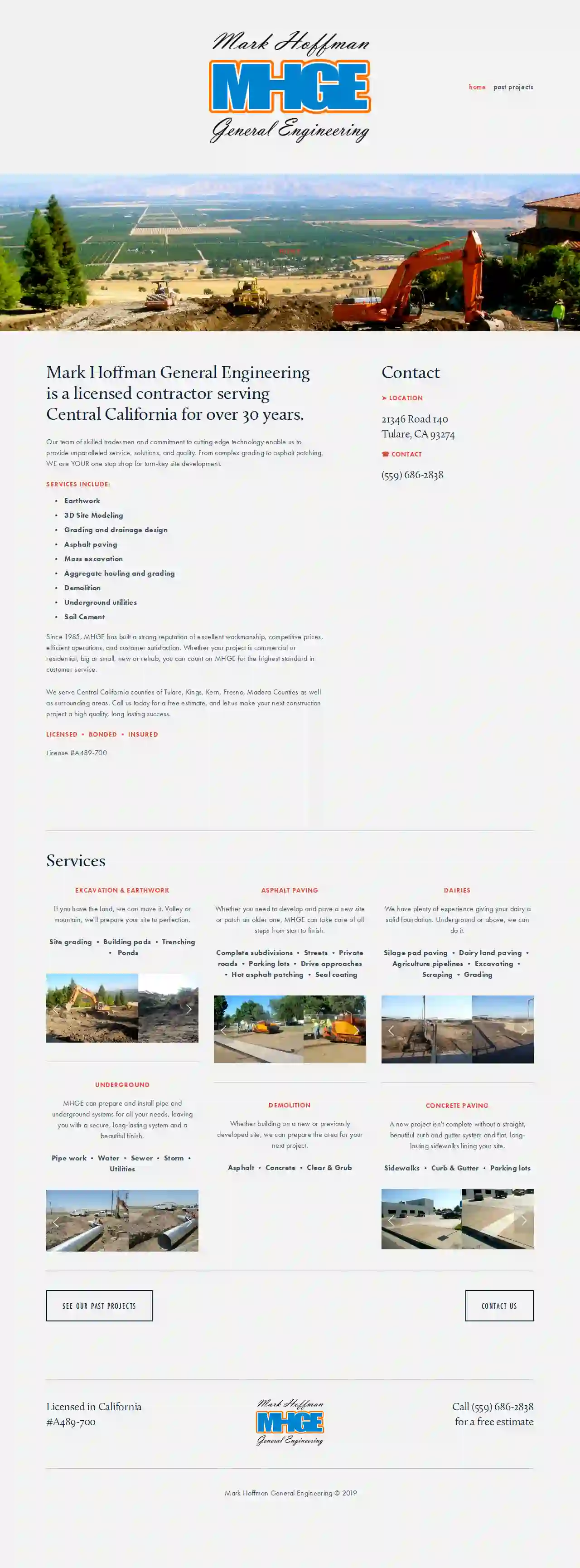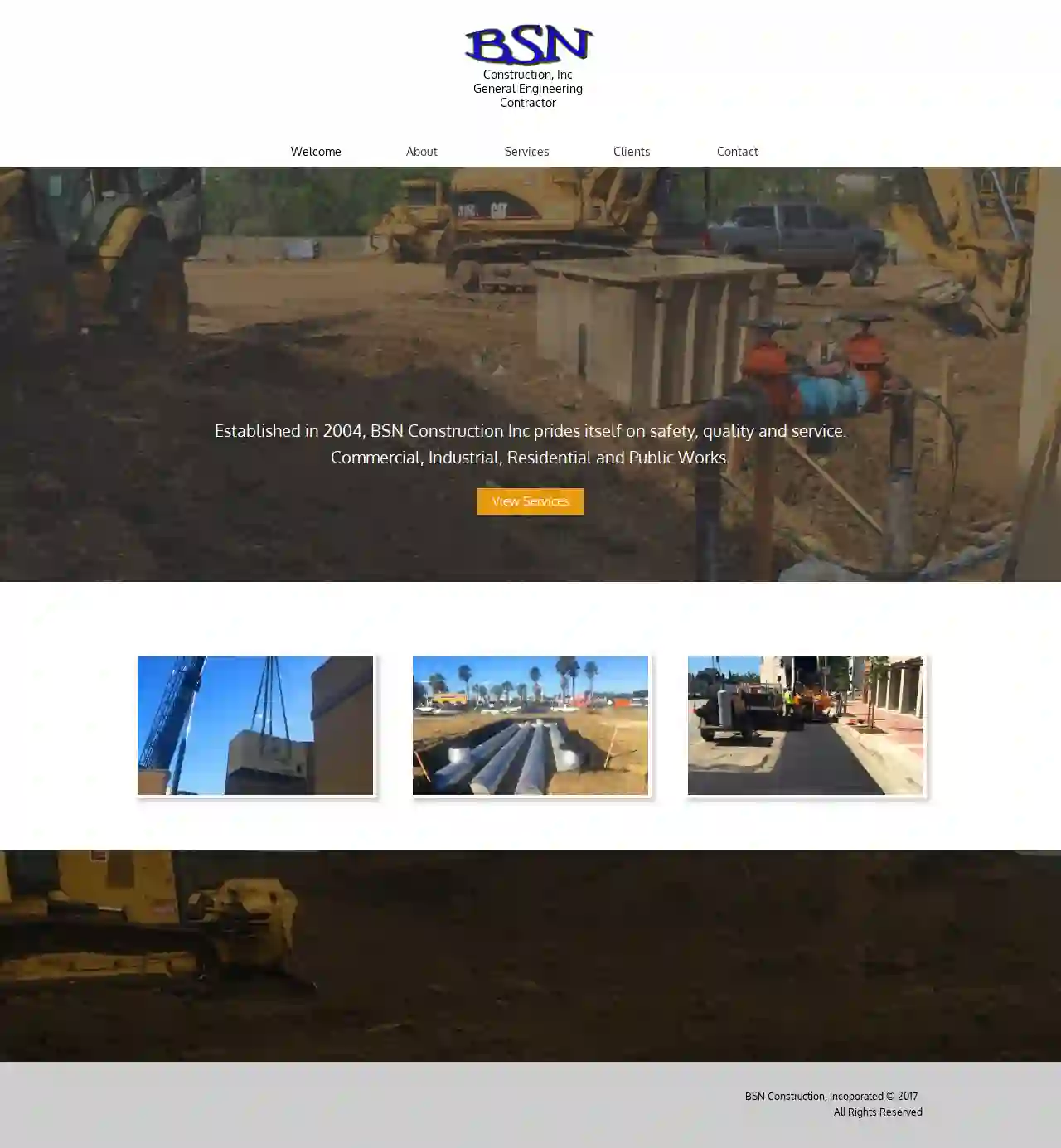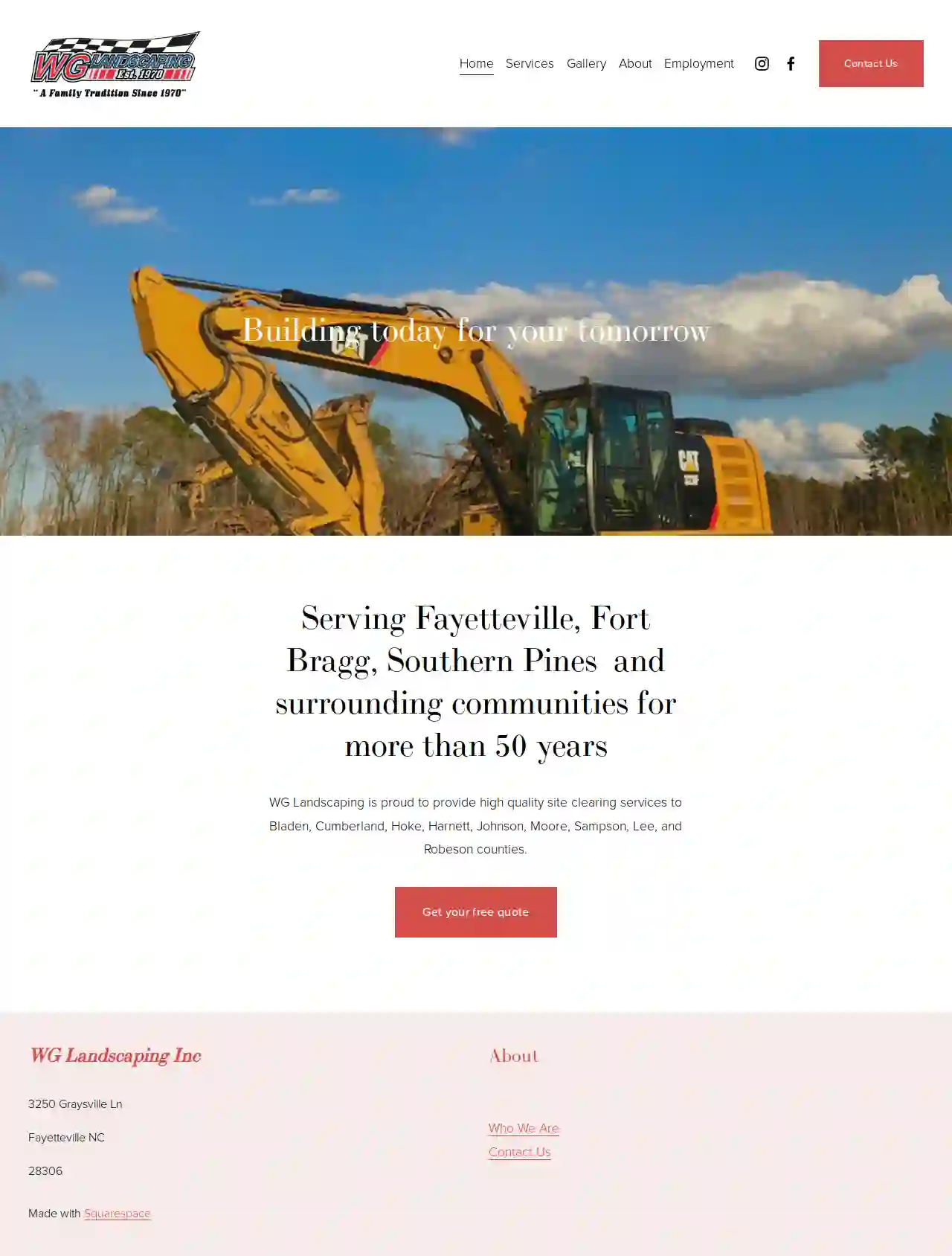Excavation Contractors Salinas
Find top Trenching Services in Salinas
Get up to 3 Excavating Contractor quotes for your project today! Compare profiles, reviews, accreditations, portfolio, etc... and choose the best offer.

Mark Hoffman General Engineering
121346 Road 140, Tulare, 93274, USMark Hoffman General Engineering Mark Hoffman General Engineering is a licensed contractor serving Central California for over 30 years. Our team of skilled tradesmen and commitment to cutting-edge technology enable us to provide unparalleled service, solutions, and quality. From complex grading to asphalt patching, we are your one-stop shop for turn-key site development. Since 1985, MHGE has built a strong reputation for excellent workmanship, competitive prices, efficient operations, and customer satisfaction. Whether your project is commercial or residential, big or small, new or rehab, you can count on MHGE for the highest standard in customer service. We serve Central California counties of Tulare, Kings, Kern, Fresno, Madera Counties as well as surrounding areas. Call us today for a free estimate, and let us make your next construction project a high-quality, long-lasting success. Licensed • Bonded • Insured License #A489-700
- Services
- Why Us?
- Gallery
Get Quote
BSN CONSTRUCTION, INC
1Suite 200, 1000 Old Country Rd, Garden City, 11747, USBSN Construction: Your Trusted Partner for Quality Construction BSN Construction is a family-owned and operated business with over 20 years of experience in the construction industry. We are committed to providing our clients with the highest quality construction services at competitive prices. We specialize in a wide range of construction projects, including residential, commercial, and industrial. We are also a licensed and insured contractor, so you can rest assured that your project is in good hands. We understand that building or renovating your home or business is a big decision. That's why we take the time to listen to our clients' needs and work with them to develop a plan that meets their specific requirements. We are also committed to providing excellent customer service and keeping our clients informed throughout the entire construction process. If you are looking for a reliable and experienced construction company, look no further than BSN Construction. We are confident that we can provide you with the quality construction services you need to make your project a success.
- Services
- Why Us?
Get Quote
A-1 Septic Services
4.675 reviewsModesto, USThe Best Value in Septic Tank Services in Merced County, Stanislaus County, and San Joaquin County Since 1990 The Best Value in Grading & Excavating in Merced County, Stanislaus County, and San Joaquin County Since 1990 Best Choice for Portable Restroom Rentals in Merced County, Stanislaus County, & San Joaquin County Expert Septic Tank Services, Grading & Excavating in Modesto, Oakdale, Escalon & Surrounding Areas For the best septic tank installation and repair, septic tank pumping, utility trenching, and grading/excavation services in Merced County, Stanislaus County, and San Joaquin County, choose A-1 Septic and AAA Backhoe Service. For over 30 years, we've been the preferred septic tank company and excavator for thousands of general contractors, builders, commercial businesses, property managers, city agencies, homeowners, and real estate agents. They trust us because we consistently deliver high quality workmanship and personalized customer service at very competitive prices. Whether you need septic tank repair in Modesto, leach line additions in Ceres, or utility trenching in Salida, we have the skills, knowledge, and expertise to get the job done according to the highest industry standards. AAA Backhoe Service holds a Class A General Engineering Contractors License from the California State License Board, and has earned an A+ rating with the Better Business Bureau. We always use the industry's best practices to ensure that all work gets completed on time, in budget, and in accordance with county and city building codes.
- Services
- Why Us?
- Accreditations
- Testimonials
- Gallery
Get Quote
Excavating Contractor Los Angeles
59 reviewsLos Angeles, USWelcome to Bobcat Excavating Services Los Angeles As an excavation services and bobcat services provider in Los Angeles, we at BSLA – Bobcat Services Los Angeles help our clients with any processes that involve removal of earth from the ground, transfer of earth from one site to another, backfilling of earth to previously excavated spaces, and modification of sites to suite various clients’ needs. Are you building or remodeling your outdoor space? Chances are that we can be of help. If you searched for “excavators near me” for you got to the right place! We are experts when it comes to excavation, bobcat services, compacting, filling and grading. We work on residential sites, commercial sites, and industrial locations. We are licensed and insured and all our machine operators are vigorously skilled in handling our heavy machinery and providing precision results.
- Services
- Why Us?
- Gallery
Get Quote
Applied EarthWorks
51 reviews1391 W. Shaw Ave., Fresno, 93711, USApplied EarthWorks: Ethical Consultants for Project Success Applied EarthWorks is a company with over 28 years of experience in cultural and paleontological resource management. We are committed to effective and affordable strategies that achieve progress and preservation, working together with our clients to ensure that projects are completed in a way that respects the environment and cultural heritage. We are certified by the California Department of General Services (DGS) as both a Small Business Enterprise (SBE) and a Small Business for Public Works (SB-PW).
- Services
- Why Us?
- Accreditations
- Gallery
Get Quote
H.I.G Contractors
54 reviews123 Main Street, Anytown, 12345, USAbout HIG Contractors HIG Contractors is a family-owned and operated business with over 20 years of experience in the construction industry. We are committed to providing our clients with high-quality workmanship and exceptional customer service. We specialize in a wide range of construction services, including: Residential construction Commercial construction Renovations Additions Roofing Siding Windows and doors Decks and patios And more! We are fully licensed and insured, and we are proud to be a member of the Better Business Bureau. We are committed to providing our clients with a positive and stress-free construction experience. We work closely with our clients to ensure that their project is completed on time and within budget. We are also committed to using environmentally friendly building practices whenever possible. If you are looking for a reliable and experienced construction company, look no further than HIG Contractors. We are dedicated to providing our clients with the highest quality construction services available.
- Services
- Why Us?
- Testimonials
Get Quote
JPI Development Group, Inc.
44 reviewsTemecula, US- Services
- Why Us?
Get Quote
Cascade Environmental
51 reviews22722 29th Drive SE, Ste 228, Bothell, 98021, USWho We Are Cascade Environmental is a field services contractor that partners with our clients to provide seamless environmental and geotechnical solutions, from concept to completion. Over the last 25+ years, Cascade has grown from a Northwest US regional drilling company into a national, full service organization offering innovative solutions for every step of your project. Mission To contribute to a sustainable future through environmental investigation and restoration. Vision To be the premier company that leverages safety, employee expertise, technology, and sustainability to continuously outperform our competition in the infrastructure and environmental remediation industry. Core Values We believe in providing a workplace free of recognized hazards for the safety, health and well-being of our employees and clients. We believe in growing our business in a responsible manner through significant investment in our people, our company, and our communities. We believe in exceeding expectations in everything we do. We believe in working together to achieve goals thru integrity, accountability, and trust. CASCADE ENVIRONMENTAL® Cascade Environmental is the leading field services provider of environmental and geotechnical drilling, site investigation, and remediation. We offer the full suite of drilling technologies including sonic, auger, rotary, and direct push. Our crews are experienced in traditional and high resolution site characterization technologies for groundwater sampling and analysis, contaminant mass and distribution, and other in situ data for detailed and accurate conceptual site models. We also offer a line of injectable amendments designed to help you reach site closure faster and cost-effectively. Who We Are Our experts understand the importance of accurate sampling regardless of geologic conditions. Whether a discrete or representative sample is needed, Cascade has the tools and technologies to obtain it. Our experienced crews can obtain samples from soil, rock and even the most difficult subsurface conditions. Cascade offers a full range of environmental drilling and sampling services for nearly any application. We conduct soil, soil gas, and groundwater sampling, including discrete and representative sampling, vertical aquifer profiling, and bedrock coring.
- Services
- Why Us?
- Gallery
Get Quote
Bob's Landclearing
44 reviews2424 Mitchell Island Road, Deltona, USAbout Bob's Landclearing, Inc. Bob's Landclearing, Inc. is a locally owned and operated business with over 35 years of experience in the land clearing industry. We are dedicated to providing honest, reliable service that stands head and shoulders above the rest. Bob, a homegrown Florida boy, will engage in plain, straightforward, truthful, and honest communication. He and his son Justin, along with their experienced employees, focus on making you happy because your satisfaction is what they strive for. When your project is completed, we want to leave you with a smile on your face that says, “Job well done.” Our commitment is to ensure the full satisfaction of all our customers, no matter how small or big the job is. At Bob’s Landclearing, Inc., we take great pride in our services as well as our reputation. To Bob, word of mouth is very important, and a positive review is entirely based on your experience with us. We can promise that we will stay true to our strong values. That way, like so many of our past customers, you will be eager to work with us again.
- Services
- Why Us?
- Our Team
- Testimonials
- Gallery
Get Quote
W G Landscaping Inc.
54 reviews3250 Graysville Ln, Fayetteville, 28306, USWho We Are Established in 1970, WG Landscaping Inc. proudly serves Fayetteville and the surrounding counties. Raised on a farm, Alford Wayne Gray Sr., was no stranger to hard work. But after years of laboring in the fields, one smoldering, hot, July morning Wayne Sr. as he was affectionately called by his family and friends, kissed his wife goodbye and set off into a neighboring town to find a better life for his growing family. As fate would have it, he not only found a job, but made a lifetime friend and mentor. Wayne Sr. had an entrepreneur spirit. While he was working and learning the lot clearing business, he was also saving. In the spring of 1970, he purchased a 2 ton dump truck and WG Landscaping was born. His sons and grandsons continue the family legacy that Wayne Sr. has left for them. And this year commemorates the 50th year of being in business.
- Services
- Why Us?
- Our Team
- Gallery
Get Quote
Over 3,943+ Excavation Companies registered
Our excavation providers operate in Salinas and surroundings!
ExcavationHQ has curated and vetted the Best Excavation Businesses in and around Salinas. Find a reliable business today.
Frequently Asked Questions About Excavation Contractors
- Experience: Choose contractors with a proven track record and years of experience in excavation projects similar to yours.
- Licensing and Insurance: Verify that they are properly licensed to operate in your area and carry adequate insurance to protect you from liability in case of accidents or damage.
- Equipment and Resources: Ensure they have the necessary equipment and resources to handle your project efficiently and safely.
- Positive Reviews and References: Check online reviews and testimonials from previous customers. Request references and contact them to inquire about their experience with the contractor.
- Professionalism: Opt for a company that communicates clearly, provides detailed and transparent estimates, and has a responsive and courteous team.
- Project Size and Scope: Larger, more complex excavations naturally take longer.
- Soil Conditions: Rocky or challenging soil types can slow down progress.
- Site Accessibility: Limited access might require more time for maneuvering equipment and hauling materials.
- Weather: Inclement weather can cause delays.
- Permitting and Inspections: Waiting for permits or inspections can extend the timeline.
- Soil Type and Stability: Stable, cohesive soils allow for deeper excavations than loose or unstable soils.
- Groundwater Level: Excavations below the water table require dewatering techniques to manage water intrusion.
- Equipment and Resources: The size and capabilities of excavation equipment influence the achievable depth.
- Safety Regulations: OSHA and other safety regulations impose limitations on trench depths without proper shoring or sloping.
- Project Requirements: The purpose of the excavation (basement, pool, foundation) determines the necessary depth.
- Project Size and Scope: The larger and more complex the excavation, the higher the cost.
- Soil Type: Different soil types require different equipment and techniques, impacting costs. Rocky or clay-rich soil can be more expensive to excavate than loose soil.
- Accessibility: Difficult-to-access sites might require specialized equipment or additional labor, increasing expenses.
- Disposal Costs: Hauling away excavated material (soil, rocks, etc.) to disposal sites incurs additional fees.
- Permits and Inspections: Depending on local regulations, permits and inspections might be required, adding to the overall cost.
How do I find a good excavation contractor?
How long does an excavation project take?
How deep can you excavate?
How much does excavation cost?
How do I find a good excavation contractor?
- Experience: Choose contractors with a proven track record and years of experience in excavation projects similar to yours.
- Licensing and Insurance: Verify that they are properly licensed to operate in your area and carry adequate insurance to protect you from liability in case of accidents or damage.
- Equipment and Resources: Ensure they have the necessary equipment and resources to handle your project efficiently and safely.
- Positive Reviews and References: Check online reviews and testimonials from previous customers. Request references and contact them to inquire about their experience with the contractor.
- Professionalism: Opt for a company that communicates clearly, provides detailed and transparent estimates, and has a responsive and courteous team.
How long does an excavation project take?
- Project Size and Scope: Larger, more complex excavations naturally take longer.
- Soil Conditions: Rocky or challenging soil types can slow down progress.
- Site Accessibility: Limited access might require more time for maneuvering equipment and hauling materials.
- Weather: Inclement weather can cause delays.
- Permitting and Inspections: Waiting for permits or inspections can extend the timeline.
How deep can you excavate?
- Soil Type and Stability: Stable, cohesive soils allow for deeper excavations than loose or unstable soils.
- Groundwater Level: Excavations below the water table require dewatering techniques to manage water intrusion.
- Equipment and Resources: The size and capabilities of excavation equipment influence the achievable depth.
- Safety Regulations: OSHA and other safety regulations impose limitations on trench depths without proper shoring or sloping.
- Project Requirements: The purpose of the excavation (basement, pool, foundation) determines the necessary depth.
How much does excavation cost?
- Project Size and Scope: The larger and more complex the excavation, the higher the cost.
- Soil Type: Different soil types require different equipment and techniques, impacting costs. Rocky or clay-rich soil can be more expensive to excavate than loose soil.
- Accessibility: Difficult-to-access sites might require specialized equipment or additional labor, increasing expenses.
- Disposal Costs: Hauling away excavated material (soil, rocks, etc.) to disposal sites incurs additional fees.
- Permits and Inspections: Depending on local regulations, permits and inspections might be required, adding to the overall cost.